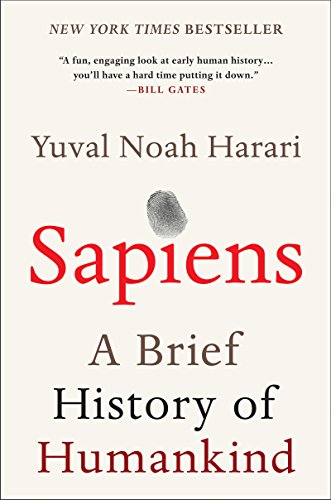Sapiens: A Brief History of Humankind by Yuval Noah Harari Link to heading
Summary Link to heading
“Sapiens: A Brief History of Humankind” by Yuval Noah Harari provides an expansive overview of the history of the human species from the emergence of Homo sapiens in the Stone Age to the current age of capital and technology. Harari explores themes such as the Cognitive Revolution, which enabled humans to imagine complex concepts such as religion, states, and corporations; the Agricultural Revolution, marking a transition from foraging to farming; the unification of humankind through the creation of money, empires, and universal religions; and the Scientific Revolution, which fuels rapid technological advancement and global interconnectedness. The book delves into how these developments have shaped societies and influenced the modern world.
Review Link to heading
The book has been widely praised for its insightful and engaging narrative that combines history, biology, anthropology, and economics. Harari’s ability to distill vast amounts of historical data into a coherent story that is both accessible and thought-provoking stands out as a major strength. “Sapiens” challenges readers to re-evaluate their understanding of human history and their place within it. However, some critiques point to Harari’s speculative tone in parts of the book and his tendency to generalize complex historical processes. Despite this, “Sapiens” has achieved significant impact, sparking discussions about humanity’s past, present, and future.
Key Takeaways Link to heading
- Cognitive Revolution: The development of language and ability for abstract thought allowed Homo sapiens to collaborate in large groups, setting them apart from other species.
- Agricultural Revolution: While it led to significant societal advances, the shift to agriculture also created social hierarchies, wars, and transformed human lifestyles.
- Power of Shared Myths: Human cooperation on a mass scale is largely driven by shared beliefs and constructs such as religions, nations, and corporations.
- Scientific Progress: The Scientific Revolution fostered unprecedented growth in knowledge, which continues to shape the global landscape.
- Human Impact and Future: Homo sapiens have become a force capable of affecting global ecosystems profoundly, presenting both risks and opportunities for the future.
Recommendation Link to heading
“Sapiens” is an informative read for anyone interested in history, anthropology, sociology, and philosophy. It is particularly beneficial for those seeking to understand the broad strokes of human evolution and the forces that have shaped modern societies. The book caters to both academic audiences and general readers who appreciate thought-provoking narratives about human progress.
